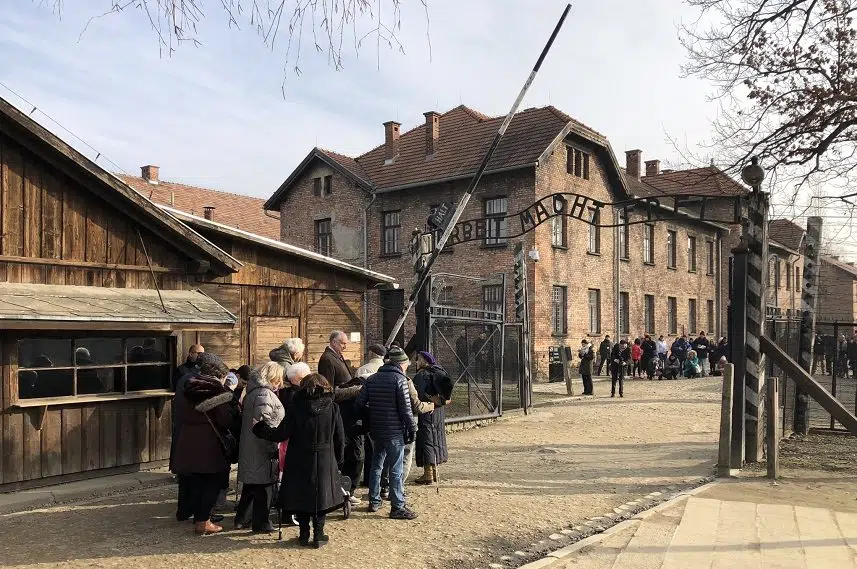Monday marks both International Holocaust Remembrance Day and the 75th anniversary of the liberation of Auschwitz concentration camp in Poland.
650 CKOM has spoken with survivors, historians and remembrance advocates to mark this significant day.
What it was like in the camps
Nate Leipciger spent 21 months in two of the Nazi death camps. He was 15 years old when he arrived.
Nazi oppression of Jews had been going on for years, but Leipciger said it reached an entirely new level when he was sent to Auschwitz-Birkenau.
“We went from being a person with family, living in not-so-wonderful conditions in a ghetto, with food rationing, hunger and disease. But, we were together as a family. We were together as people,” he recalled.
“When we entered the box cars … suddenly, we stopped being a family. We were turned into non-individuals. We were given a death sentence.”
The gas chambers, starvation, torture and separation of families all contributed to a dehumanization of Jews and other groups, like Jehovah Witnesses, Quakers, people with mental and physical disabilities, LGBTQ people and others.
Leipciger still feels the effects of his experience to this day.
“(We lived) a life of prisoners condemned to death. Without a trial, without being guilty, without committing any offense or crime whatsoever. Suddenly, we became despised criminals,” he said.
“I still don’t understand how my mind could remain sane.”
Both his mother and sister were killed in the gas chambers.
His trials would continue on even after his liberation, as he suffered from typhoid fever. After that, it took three years for him to relocate to Toronto in 1948 as a refugee. He went on to become an electrical engineer. Currently, he’s living in Florida.
A look at liberation
Kayla Hock was imprisoned in a camp at Murafa, Ukraine at age 10. She spent over three years there.
“You grow up fast under those circumstances.”
In 1944, she was freed, a bittersweet moment that was difficult for her to explain.
“I felt like we were able to live again. They gave us food, which was something we didn’t see much of. It was incredible, there’s no way to describe those feelings,” she recounted.
“It’s an emotion that — please, God, I hope no one ever has to live through that — but it was amazing.”
She said it was a very close call, and the Russians arrived just in time.
“(The Nazis) already had graves dug, because they knew they were losing the war, and they had the graves dug to ‘finish the job’ so to speak,” she said.
“Russian partisans came in first … they said ‘it’s OK, don’t be afraid, the army is right behind us, and we are going to see to it that those graves are not going to be filled.’ True to their word, two days later, the Russian army came in and liberated the camp.”
Looking back at her experiences, Hock said remembering history’s darkest moments is important to building a better world.
“Start respecting each other. We’re all human beings. We all have a way to live in peace, and respect your neighbour and respect one’s religion, customs and traditions.”
The importance of remembrance
Heather Fenyes, a board member of Concentus Citizenship Education in Saskatoon, spends much of her time promoting awareness and remembrance of the Holocaust. Her mother-in-law is a camp survivor.
“It’s almost like I feel like I’m in a race, and I only have a finite amount of time to get this incredible, important message out.”
She sees two main reasons to keep the historical knowledge alive: To pay respect to the survivors, and to make sure it never happens again.
“Be mindful of the troubling rise in anti-Semitism we see today,” she said.
Kevin Hicks, a Saskatoon historian, agrees. He sees Holocaust denial as a troubling issue.
“There are so many people who promote the fact that it was overstated or it didn’t happen, but I tell them this: Go and have a look yourself.”
“It could happen again; all it takes is for good people to do nothing.”











